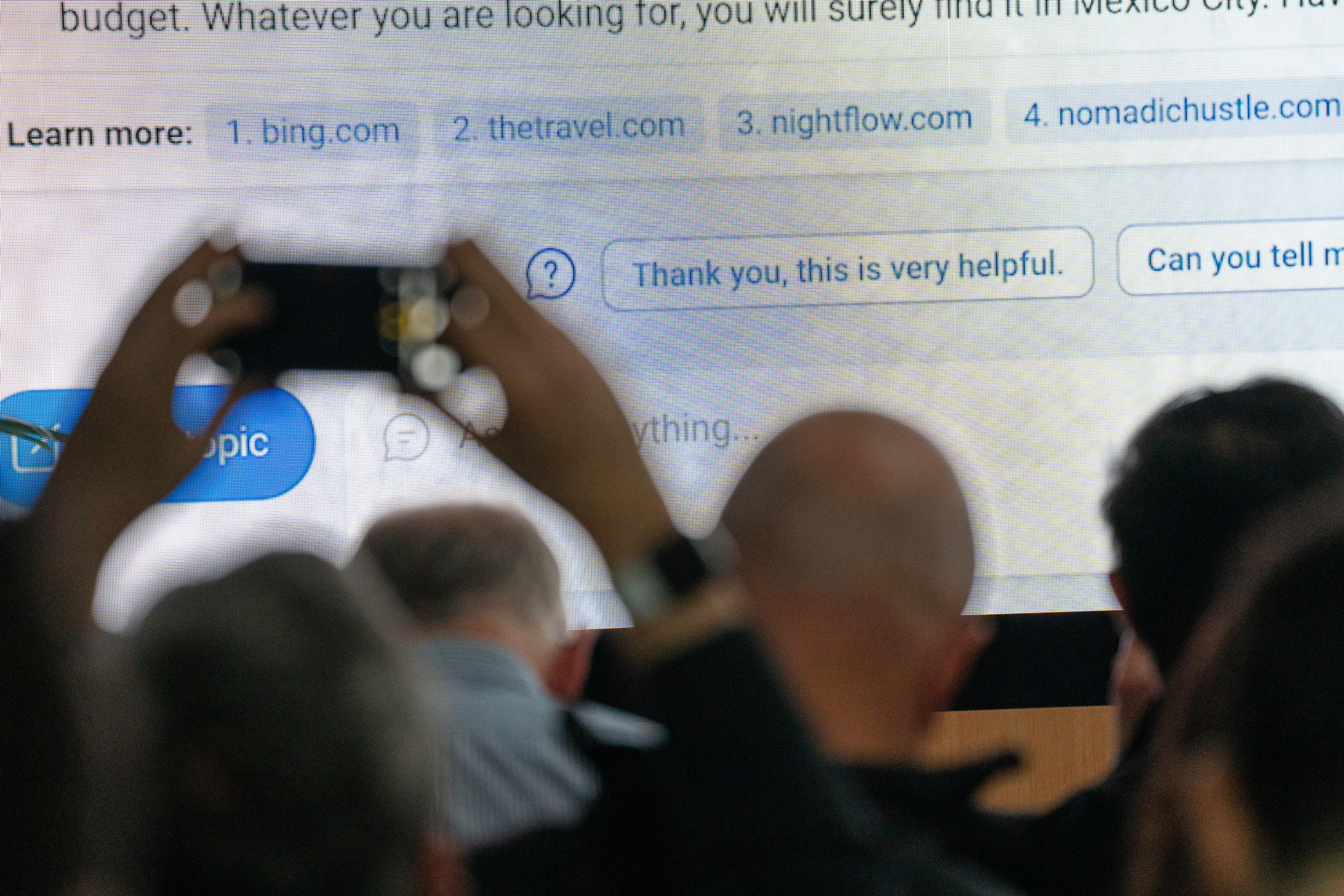
For decades, Google has dominated two core elements of the way we use the internet: search engines and browsers. But the rise of new AI tools means those near-monopolies are looking shakier than they have in years.
On Tuesday, Microsoft launched an attempt to dethrone Google, announcing that it would integrate the powerful AI behind the breakout chatbot ChatGPT into its rival search engine, Bing, and its web browser Edge.
The technology will allow Bing to better answer more conversational queries that traditional search engines currently struggle with, Microsoft said in a blog post. Web search in its current form is “great for finding a website, but for more complex questions or tasks too often it falls short,” the blog post said. “Today we’re improving how the world benefits from the web by reinventing the tools billions of people use every day, the search engine and the browser.”
Read More: The Creator of ChatGPT Thinks AI Should Be Regulated
Microsoft’s announcement came a day after Google said it would make its own chatbot, called Bard, available to the public “in the coming weeks.” That tool, Google CEO Sundar Pichai wrote in a blog post, would be able to provide users with succinct answers to their questions, drawn from reliable sources of information on the web. Similar AI-powered upgrades would be coming soon to Google’s core web search product too, Pichai wrote. “Soon, you’ll see AI-powered features in Search that distill complex information and multiple perspectives into easy-to-digest formats, so you can quickly understand the big picture and learn more from the web.”
For years, Silicon Valley giants have been positioning themselves to dominate AI, which many executives believe will define the next generation of consumer tech. But 2022 was an unprecedented year for both AI breakthroughs and tech companies’s willingness to release those breakthroughs to the public. Seemingly overnight, the newly-released image generation tools Dall-E and Stable Diffusion ignited a cultural conversation about the validity of AI art. And when Dall-E’s developer OpenAI launched ChatGPT in late November last year, it captured the world’s attention in a way that few could predict. The tool reached more than 100 million users in January, according to an estimate from UBS, making it the fastest-growing consumer application in history.
Read More: AI Chatbots Are Getting Better. But an Interview With ChatGPT Reveals Their Limits
Suddenly, the world’s biggest tech companies began to redouble their AI efforts in earnest. In January, Microsoft plowed $10 billion into OpenAI, announcing that its machine learning tools would be integrated into Microsoft’s suite of office software. In late 2022, Google invested some $300 million to acquire a roughly 10% stake in Anthropic, an AI research lab said to be on the verge of releasing its own powerful chatbot software. “A race starts today,” Microsoft’s CEO Satya Nadella said Tuesday.
Microsoft’s bid to disrupt Google’s dominance of core internet functions—Google holds some 93% of the worldwide search engine market share and 65% of the browser market share, according to Statcounter—suggests that even as Nadella continues with mass layoffs amid a darkening economic climate, he also believes that the potential opportunities arising from AI are worth betting big on.
“The thing that’s exciting is the fact that [Google] will have to innovate,” Nadella told Bloomberg. “It’s a new paradigm. It’s a new day, and search innovation is back into the forefront. The fact that the largest software category with the best economics is back in [the] contest is just fantastic.”
Even if Google is able to hold onto its dominance of web search, the presence of viable competition in the form of Microsoft could have big repercussions for the shape of the tech industry. Google currently pays Apple $15 billion per year to be the default search option on the iPhone; Microsoft may attempt to offer Apple more in order to win Bing a large chunk of new users, Alexandr Wang, the CEO of Scale AI, predicted on Twitter. “Google’s $15B deal with Apple to be the default search on iPhone will be re-negotiated and be a bidding war between Microsoft/Bing and Google,” he wrote. “If Microsoft is willing to spend $10B on OpenAI, they’ll spend even more here.”
But Google may have other tricks up its sleeve. In his announcement Monday, Pichai mentioned Google’s text-to-image software Imagen and its text-to-music tool MusicLM, both of which are currently not accessible for public use. “We’re working to bring these latest AI advancements into our products,” Pichai wrote.
More Must-Reads from TIME
- Cybersecurity Experts Are Sounding the Alarm on DOGE
- Meet the 2025 Women of the Year
- The Harsh Truth About Disability Inclusion
- Why Do More Young Adults Have Cancer?
- Colman Domingo Leads With Radical Love
- How to Get Better at Doing Things Alone
- Michelle Zauner Stares Down the Darkness
Write to Billy Perrigo at billy.perrigo@time.com